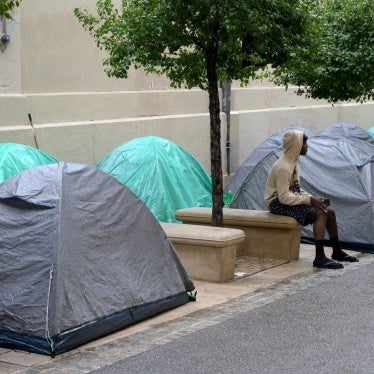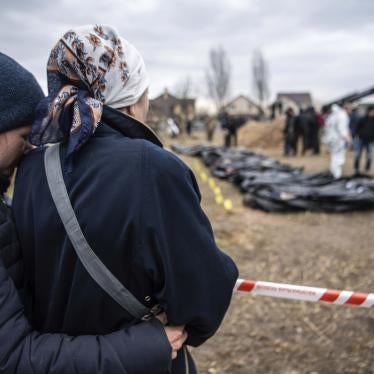We write in advance of the 83rd Session of the Committee on the Elimination of Discrimination Against Women (“the Committee”) and its review of Armenia to highlight areas of concern regarding the government of Armenia’s compliance with the Convention on the Elimination of All Forms of Discrimination against Women (CEDAW). This submission addresses articles 1, 2, and 10 of the Convention and covers violence against women and girls, access to education during the Covid-19 pandemic, and protection of education from attack. This is an updated submission following Human Rights Watch’s June 2021 submission to the Committee during its 81st pre-session for its review of Armenia.[1]
Violence Against Women (articles 1 and 2)
In December 2017, Armenia’s parliament passed a law on violence in the family, putting in place a legal framework to address violence against women.[2] However, women and girls remain at risk until the police comprehensively change how they respond to complaints of domestic violence and the government ensures accessible, quality services for survivors.
Domestic violence cases remain largely underreported. According to the 2021 Survey on Domestic Violence against Women in Armenia, only 5 percent of women who experiences physical or sexual violence said they sought help from police and 53.5 percent said that help is not expected from anyone.[3]
In 2017, Human Rights Watch spoke with 12 survivors of severe domestic abuse in Armenia. The women said their husbands or male partners punched and kicked them, raped them, struck them with furniture and other objects, confined them in their homes, stalked them, and threatened or attempted to kill them with knives or other sharp objects. Five women said the attacks against them continued during pregnancy; three said they had miscarriages after their husbands beat them.[4]
Those interviewed said that when they reported abuse to police or other authorities, the authorities did nothing to investigate cases, prevent further violence or hold the attackers accountable. In some cases, the authorities encouraged women to drop complaints and reconcile with their abusers. The authorities did not refer the women for services or assistance.
The 2017 family violence law requires police to intervene urgently “when there is a reasonable assumption of an immediate threat of repetition or the continuation of violence” in the family. But in practice, law enforcement bodies lack awareness and training on protection mechanisms envisaged by the law, such as protection orders, and do not adequately use them.
According to official data, during the first six months of 2022, authorities investigated 391 criminal domestic violence complaints. Charges were brought against 128 persons, and in 85 of those the husband was identified as the alleged perpetrator. Twenty-one cases were initiated on failure to fulfill urgent intervention or protective orders on domestic violence.[5]
Lack of Legal Remedies
Armenian law does not effectively protect survivors of domestic violence. The law defines domestic violence as “a physical, sexual, psychological, or economic act of violence” between family members, including spouses in unregistered marriages. It is not clear if the law applies to couples who are not in either registered or unregistered marriages.
Just before submitting the law on violence in the family to parliament in mid-November 2017, the government revised the law to include “strengthening of traditional values in the family” as a key principle. Authorities also changed the title to add the concept of “restoring harmony in the family.”
The Coalition to Stop Violence against Women, a union of local women’s rights groups, expressed concerns that the new law’s principle of “traditional values” could be used to reinforce obsolete and problematic gender roles and stereotypes. Activists also fear an emphasis on “restoring harmony” could be used to pressure women to remain in abusive relationships. In addition, domestic violence is neither a stand-alone felony nor an aggravating criminal circumstance in the criminal code.[6]
The government signed the Council of Europe Convention on Preventing and Combating Violence against Women and Domestic Violence (Istanbul Convention) in 2018, but the ratification process has stalled amidst a campaign by some government officials that promoted blatant falsehoods about the convention.[7]
Inadequate shelter, rehabilitation, and support services
Many women said they lived with their abusers for years because they had no means of escape. The country has only two domestic violence shelters, both in the capital, Yerevan, run by nongovernmental organizations, each with a capacity for five women and their children. Shelters, and many services, are generally not accessible to women with disabilities. Council of Europe standards call for at least one specialized shelter in every region, and one shelter space per 10,000 people. With a population of approximately 2.9 million, Armenia should have approximately 290 shelter spaces. The new law mandates creating government-run shelters, but does not specify the number of shelters or their capacity. Armenia also lacks a general hot-line service for survivors of domestic violence.[8]
Human Rights Watch recommends that the Committee call on the government of Armenia to:
- Ensure the prompt, thorough, and impartial investigation of all domestic violence cases, using methods that mitigate risks for survivors, and prosecute and punish the attackers.
- Train all law enforcement agents and the judiciary about the 2017 family violence law, and take measures to monitor its enforcement and impact.
- Ensure immediate access to protection for survivors of domestic abuse through increasing the availability of shelter spaces, including in rural areas, the issuing of short- and long-term protection orders, and making shelters and services accessible to women with disabilities.
- Make available comprehensive and quality medical, psychological, legal, and other services for domestic violence survivors and their children.
- Take steps to educate the public about the law, how to file complaints, and the availability of services.
- Amend the law or criminal code to make domestic violence a standalone criminal offense. Such a step would help to ensure an optimal response, particularly in cases of abusive patterns of behavior in which individual acts of violence do not reach the criminal threshold.
- Ratify the Istanbul Convention without further delay.
Access to Education during the Covid-19 Pandemic (article 10)
In response to the Covid-19 pandemic, Armenia closed its schools and opted for various forms of distance learning for its students.[9] In 2020, Armenia’s schools were fully closed for nine weeks and only partially open for four weeks, affecting 600,000 students.[10]
According to UNICEF, emergency measures taken during the first months of the pandemic, including distance learning, made it possible for 80 percent of schoolchildren in primary through upper-secondary school to continue their learning during the school closures.[11] Despite this, those in low-income households and children with special educational needs and disabilities were among the hardest to reach.[12]
Interviews Human Rights Watch conducted in Armenia showed some negative impacts on women’s daily lives and girls’ education.
One girl we interviewed described how the limited number of devices at home affected her ability to learn. “Me and my brother were using the same mobile phone,” said the 16-year-old student from Armavir, Armenia. “His classes would start later than mine, but there were times when they would coincide, and I would miss classes.”[13] The girl elaborated, saying that because she couldn’t call her teacher to explain the lesson again, she “was reading [her]self, trying to self-educate.”[14]
The girl also took on more responsibilities while at home learning remotely and said: “I had to allocate more time to learning, and also to help to my younger brother both during classes and to do homework.”[15]
Individuals we interviewed also spoke of the additional responsibilities placed on women while their children were home learning. One mother Human Rights Watch interviewed said: “I have all the household on me, now I have to do teaching too. Teachers get paid for it, but now I have both teaching and household responsibilities.” She added: “I have a husband, but it is like there is no one.”[16]
One 13-year-old boy we interviewed said that before the pandemic, his teacher would explain the lesson at school, and his mother or sister would explain it one more time at home.[17] This changed after the pandemic. “When we started distance classes all the burden and expectations were on us and on my mother,” the boy said. “My mother had to record the lesson for me, then I learned it, we recorded my homework and sent it to teacher.”[18]
Financial difficulties affected girls’ ability to access online learning, as well as further compound the stressors women face when caring for children at home. A mother we interviewed said: “I asked the school of my daughter for device, they said they will provide a computer if I have cable internet connection at home, I do not have and do not have enough earnings to get it.”[19]
Human Rights Watch recommends that the Committee call on the government of Armenia to:
- Explicitly allocate educational resources strategically to vulnerable and low-income groups, children traditionally at risk of exclusion from education, including girls, children with disabilities, and those shown to have been particularly affected in their education during the pandemic.
- Adopt measures to ensure access to affordable, reliable, quality, and accessible internet, including targeted measures to provide free, equitable access to the internet for educational content, and capable devices for every student. Children most likely to be excluded or have inadequate access, including those from marginalized or vulnerable communities, living in rural areas, with disabilities, or living in families with multiple children, or due to their gender, should receive targeted support.
- Focus on mitigating the disproportionate effects on children and adolescents who already experience barriers accessing education, or who are at higher risk of being excluded, including girls, ones who come from poor households, or who come from other vulnerable communities.
Protection of Education from Attack (article 10)
In September 2021, Human Rights Watch released a publication documenting attacks on schools by both sides to the conflict during the Nagorno-Karabakh War.[20] The report looked at what happened to schools during the fighting between September 27 and November 9, 2020, and revealed some of the consequences of the conflict for school children. We examined multiple cases of attacks on schools and the military use of schools by all parties to the conflict.
As recognized by this Committee in its General Recommendation No. 30, attacks on students and schools, and the use of schools for military purposes, disproportionately affect girls, who are sometimes the focus of targeted attacks and are more likely to be kept out of school due to security concerns.[21]
In March 2017, Armenia endorsed the Safe Schools Declaration.[22] The Safe Schools Declaration is a political commitment to take concrete steps to make students, teachers, and schools safer during armed conflict.[23]
Human Rights Watch recommends that the Committee congratulate Armenia on endorsing the Safe Schools Declaration and call on the government of Armenia to:
- Ensure Armenian laws, policies, or trainings provide explicit protection for schools and universities from military use during armed conflict.
- Share any examples of its implementation of the Safe Schools Declaration with other countries that have endorsed the Safe Schools Declaration.
[1] “Submission to the Committee on the Elimination of Discrimination against Women Review of Armenia, 81st pre-session,” Human Rights Watch statement, June 24, 2021, https://www.hrw.org/news/2021/06/24/submission-committee-elimination-discrimination-against-women-review-armenia.
[2] “The Law on Prevention of Violence in the Family, Protection of Victims of Violence in the Family, and Restoration of Peace in the Family,” https://www.refworld.org/pdfid/5a6b2e274.pdf (accessed June 17, 2021).
[3] Survey on Domestic Violence against Women: Analytical Report, 2021, https://armstat.am/file/article/gbv_report_eng.pdf (accessed September 16, 2022).
[4] “Armenia: Little Protection, Aid for Domestic Violence Survivors: New Law Should Enhance Safety, Services, Justice,” Human Rights Watch news release, January 12, 2018, https://www.hrw.org/news/2018/01/12/armenia-little-protection-aid-domestic-violence-survivors.
[5] “Information on the Results of the Investigation of Domestic Violence Cases in the Proceedings of the RA Investigation Committee in 2020,” February 19, 2021, Investigative Committee of the Republic of Armenia (accessed July 27, 2022); “Summary information about the criminal cases investigated by the RA Investigative Committee during the first half of 2022 regarding domestic violence,” Investigative Committee, July 27, 2022, https://www.investigative.am/news/view/2022-tvakani-arajin-kisamyak-yntanekan-brnutyunner.html (accessed September 13, 2022).
[6] Anahit Chilingaryan, “Countering Domestic Violence Myths in Armenia: European Rights Body Issues Key Opinion,” commentary, Human Rights Dispatch, October 24, 2019, https://www.hrw.org/news/2019/10/24/countering-domestic-violence-myths-armenia.
[8] “Armenia: Little Protection, Aid for Domestic Violence Survivors: New Law Should Enhance Safety, Services, Justice,” Human Rights Watch news release, January 12, 2018, https://www.hrw.org/news/2018/01/12/armenia-little-protection-aid-domestic-violence-survivors.
[9] “Global monitoring of school closures caused by Covid-19: Distance learning modalities,” UNESCO, https://covid19.uis.unesco.org/global-monitoring-school-closures-covid19/country-dashboard/ (accessed September 2, 2022).
[10] “Global monitoring of school closures caused by Covid-19: Data by Country,” UNESCO, https://covid19.uis.unesco.org/global-monitoring-school-closures-covid19/country-dashboard/ (accessed September 2, 2022).
[11] UNICEF, Distance Education and Remote Learning Practices in Armenia: Analysis of the Education System Response to COVID-19, 2022, https://www.unicef.org/armenia/media/12701/file/Distance%20Education%20and%20Remote%20Learning%20Practices%20in%20Armenia.pdf (accessed September 2, 2022), p. 12.
[12] “As COVID-19 numbers stabilise Armenia goes back to school,” OC Media, September 15, 2020, https://oc-media.org/as-covid-19-numbers-stabilise-armenia-goes-back-to-school/ (accessed September 2, 2022); UNICEF, Distance Education and Remote Learning Practices in Armenia: Analysis of the Education System Response to COVID-19, 2022, https://www.unicef.org/armenia/media/12701/file/Distance%20Education%20and%20Remote%20Learning%20Practices%20in%20Armenia.pdf (accessed September 2, 2022), p. 12.
[13] Human Rights Watch interview with 16-year-old student, Armavir, Armenia, June 16, 2020.
[14] Ibid.
[15] Ibid.
[16] Human Rights Watch interview with mother, Yerevan, Armenia, via phone, April 29, 2020.
[17] Human Rights Watch interview with 13-year-old boy via Zoom, June 30, 2020.
[18] Ibid.
[19] Human Rights Watch interview with mother, Yerevan, Armenia, via phone, April 29, 2020.
[20] Bill Van Esveld and Tanya Lokshina, “Lessons of War: Attacks on Schools During the Nagorno-Karabakh War,” commentary, Human Rights Watch witness piece, September 8, 2021, https://www.hrw.org/news/2021/09/08/lessons-war.
[21] United Nations Committee on the Elimination of Discrimination against Women, General Recommendation 30, Women in conflict prevention, conflict and post-conflict situations (2013), Compilation of General Comments and General Recommendations Adopted, UN Doc. CEDAW/C/GC/30 (2013).
[22] Global Coalition to Protect Education from Attack, “Safe Schools Declaration Endorsements,” https://ssd.protectingeducation.org/endorsement/ (accessed September 2, 2022).
[23] “Safe Schools Declaration,” 2015, https://www.regjeringen.no/globalassets/departementene/ud/vedlegg/utvikling/safe_schools_declaration.pdf (accessed August 23, 2022).






